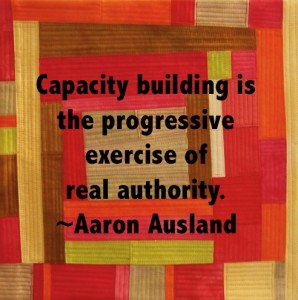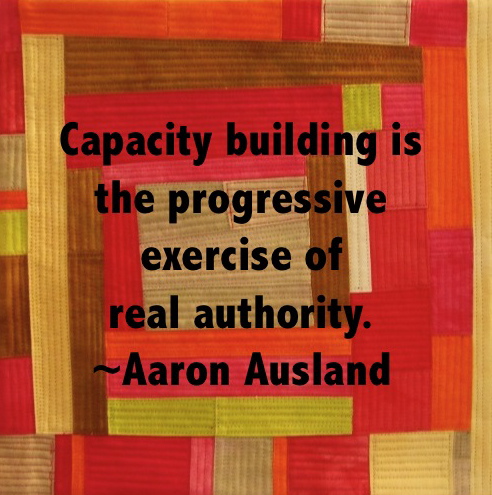I’ve been thinking a lot about organizational growth and evolution these days. Here’s sixteen elements of an organization that change as it gets stronger, as described by Phil Bartle, PhD on the NGO Café.
- Altruism: proportion and degree to which individuals are ready to sacrifice benefits to themselves for the benefit of the organization as a whole – reflected in the degrees of generosity, individual humility, communal pride, mutual supportiveness, loyalty, concern and camaraderie.
- Values: degree to which individuals share values, especially the idea that they belong to a common entity that supersedes the interests of individuals.
- Services: the more that individuals have access to communal or shared facilities, the greater the capacity of the organization.
- Communications: willingness and ability – which implies tact, diplomacy, listening.
 Confidence: belief that the organization can achieve whatever it sets out to do – positive attitudes, optimism, self-reliant rather than dependent, avoidance of apathy and fatalism, vision of what is possible.
Confidence: belief that the organization can achieve whatever it sets out to do – positive attitudes, optimism, self-reliant rather than dependent, avoidance of apathy and fatalism, vision of what is possible.- Context: leaders enabling rather than patronizing, operating on a self-managed basis.
- Information: ability to process and analyze information, level of awareness, knowledge and wisdom found within individuals and the group as a whole.
- Intervention: not afraid to confront hard issues, preventative rather than reactive.
- Leadership: about power, ability and influence to move the organization forward, enabling and facilitating role to operate the organization in support of its goals, leaders must have skills, willingness and charisma.
- Networking: extent to which leaders know individuals an other organizations who can provide useful resources to strengthen the organization as a whole.
- Organization: degree to which individuals see themselves as having a role that contributes to the whole, in contrast to being a mere collection of separate individuals – organizational integrity, structure, procedures, decision-making processes.
- Power: political.
- Skills: ability to get things done – managerial, technical, organizational, mobilizing.
- Trust: degree to which members of the organization trust each other and their leaders – which is, in turn, a reflection of the degree of integrity – honesty, dependability, openness, transparency, trustworthiness.
- Unity: sense of belonging to a known entity, the degree to which individuals are willing to tolerate differences and variations among each other, willingness to cooperate and work together.
- Wealth: degree to which organization has control over its actual and potential resources.
What do you see changing for the better in your organization these days? Please share in the comments section.
***
Related Posts
The wisdom of dlalanathi: Reflections on organizational growth
A New Discipline for Development Practitioners
How to build strong relationships with grassroots organizations – Part 3


This is a nice list of positive attributes that a not for profit (or even government or for-profit) organization should have.
One challenge though is that as organizations grow in size (rather than in strength) then it becomes naturally harder to maintain some of these attributes – in particular the sense of shared values, unity and trust become harder to maintain as the distance between individuals within the organization and their ability to identify with the whole becomes larger.
Others such as the resource and skill and knowledge base will increase with size as will the influence of the organization and its capacity to take work to scale.
An interesting challenge on how to get the benefits of scale without the disadvantages!
So interesting to think about! I’m really working on #10 Networking this year. I’ve done a lot of book learning about international development and fundraising in past years and this year I want to step out and start talking to more people face to face!
Good list.
From my experience, clear procedures contribute a lot to the organization’s strenght. They can be burden for employees, but still, their importance rise as organization grow.
And about shared values and unity, as Ian noticed, it is hard to maintain such a spirit especially if people work on different places far away from each other. On the other hand no metter how far they are, organization need a value that wil be its cohesive strenght.
If a leader is trying to just maintain 2 or 3 things that embody all of this list, I would say that it begins with being a fun place to be and fun “real” people to work with. That fun can naturally springboard into excellence and a culture that magnetically attracts other people who want to make a difference.
And once you have a fun, inviting culture committed to excellence, you’ll actually start to see that the work you do is meaningful to others, provided you are paying attention to the world and not just yourselves. I’ve been in fun places where excellence didn’t follow, and it was because the fun was internal, not part of an ecosystem of people committed to doing something meaningful.